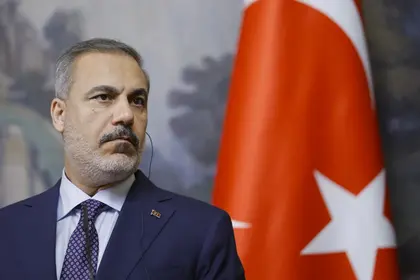Turkey's foreign minister Hakan Fidan said on a visit to Moscow on Thursday, August 31, that reviving a deal to ship Ukrainian grain across the Black Sea was "critical" for food security.
Fidan was in Moscow to prepare an informal summit between Turkish President Recep Tayyip Erdogan and Russian leader Vladimir Putin in Russia's Black Sea resort city of Sochi, expected next week.
JOIN US ON TELEGRAM
Follow our coverage of the war on the @Kyivpost_official.
"We underlined its critical role for global food security and stability in the Black Sea," Fidan said during a joint media appearance with his Russian counterpart Sergei Lavrov.
Moscow pulled out last month from the UN-backed grain agreement that Turkey helped broker.
Both Ukraine and Russia have since laid plans to start shipping grain outside the framework of the deal.
Moscow says the previous agreement imposed indirect restrictions on its grain and fertiliser exports by limiting Russia's access to global payment systems and insurance.
Lavrov repeated Russia's position that it will return to the deal once its demands are met.
"Everything rests on the fact that the West is hindering the solution of problems that prevent a more active export of Russian grain and fertiliser," Moscow's top diplomat said.
Turkey wants the warring sides to return to the agreement and use it as a basis for broader peace talks.
Fidan said Turkey wanted to begin a "process focused on understanding and answering Russia's demands".

Russia Claims Capture of Two More East Ukraine Villages
As the Turkish diplomat visited Moscow, UN chief Antonio Guterres said Thursday he had sent a letter to Lavrov with a "set of concrete proposals, allowing to create the conditions for the renewal of the deal."
Guterres said he had taken "into concern Russian requests" and that the proposal included "some concrete solutions for allowing more effective access of Russian food and fertilisers to global markets at adequate prices."
The agreement helped Ukraine export more than 30 million tonnes of grain and foodstuffs in the year it remained in effect.
This helped bring down global food prices that soared in the wake of Russia's military operation in Ukraine and ease levels of hunger in Africa and parts of the Middle East.
You can also highlight the text and press Ctrl + Enter






